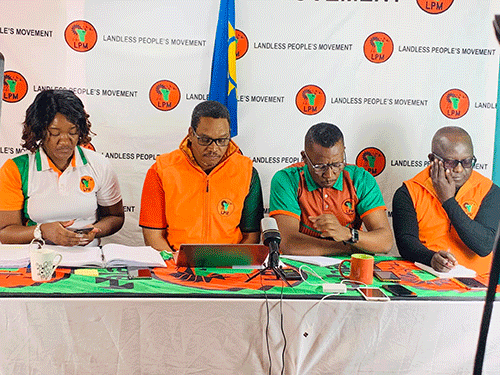The Landless People’s Movement leader, Bernadus Swartbooi, has said his party will do whatever it takes to block the planned uranium mine in the Aminuis constituency in the Omaheke region.
Swartbooi said they would go to great lengths to enlist the assistance of experts before approaching the African Commission on Human and Peoples’ Rights to request that the proposed drilling be halted.
“We cannot have in the Aminuis, Stampriet and Aranos basin uranium mining that will destroy the vast areas if our agricultural sector. We can’t have it; we don’t want it; we don’t need it,” Swartbooi said, adding that in spite of Namibia having so many uranium mines in the country, no Namibian has benefited except for jobs.
He said this at a press conference earlier this week in response to the drilling of boreholes in the constituency by Headspring Investments’ Project Wings, a subsidiary of Uranium One, which is part of Rosatom, a Russian state-owned uranium exploration, mining and processing company.
Recently, the company reiterated all chemicals being used in its exploration activities are environmentally friendly, compared to conventional open-pit and underground mining; thus, farmers in the area should not be worried.
The company is expected to use the in-situ leaching (ISL) method to extract uranium.
ISL, also called in-situ recovery or solution mining, is a mining process used to recover minerals, such as copper and uranium, through boreholes drilled into a deposit.
In-situ leach works by artificially dissolving minerals occurring naturally in a solid state.
Uranium One operates six in-situ recovery mines in Kazakhstan, which has a total yearly uranium production of 10 000 tonnes.
The 25-year Namibian project is anticipated to be of the same scale as one of the mines in Kazakhstan.
So far, four exploration rigs have been set up in the Omaheke region.
Once it starts mining, the company said it could invest between US$300 million to US$500 million over 25 years.
According to Swartbooi, there is already scientific proof that natural subsurface water would become so contaminated it will never be recovered.
“The evidence is already in there in communal areas, where Rossing has been mining for many years that boreholes drilled the water is just completely contaminated,” he added.
- ktjitemisa@nepc.com.na


